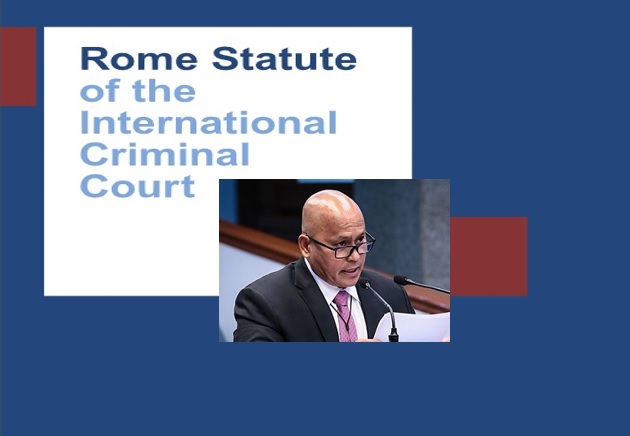Suddenly the battle cry of the pro-Duterte apologists in government is sovereignty. No one cried sovereignty when the Senate of the Philippines ratified the Rome Statute of the International Criminal Court on August 23, 2011. In fact, Senate Resolution 546 recommended the approval “without amendment.”
Per Rome Statute, ratification is not complete until a country’s instrument of ratification is deposited at the United Nations in New York, signifying that it has “acceded.” That was officially fulfilled on August 30, 2011 when senator Loren Legarda (chair, Senate Committee on Foreign Affairs) presented the Philippine instrument at the UN headquarters.
The signatories were senators Miriam Defensor Santiago, Edgardo J. Angara, Ferdinand R. Marcos Jr., Francis G. Escudero, Teofisto L. Guingona III, Gregorio B. Honasan, Ramon Bong Revilla Jr., Manny Villar, Antonio F. Trillanes IV, Jinggoy Ejercito Estrada, Vicente C. Sotto III, Allan Peter S. Cayetano, Pia S. Cayetano, Panfilo M. Lacson, Sergio R. Osmeña III, Francis N. Pangilinan, and Aquilino L. Pimentel III. The Senate President was Juan Ponce Enrile, the lone dissenting vote.
Defensor Santiago’s subcommittee had previously conducted a hearing on July 28, 2011, and the following agencies and organizations endorsed the Rome Statute: Departments of Foreign Affairs, Justice, and National Defense, Commission on Human Rights, Armed Forces of the Philippines, Philippine National Police, National Security Council, Philippine Coalition for the International Criminal Court, Coalition for the International Criminal Court Asia Pacific, Philippine Alliance of Human Rights Advocates, and Amnesty International Philippines.
Few of them now recall that earlier on July 27, 2009, the Philippines enacted Republic Act 9851 defining and penalizing crimes against international humanitarian law, genocide and other crimes against humanity. President Gloria Macapagal Arroyo signed it into law on December 11, 2009. This RA, also known as the International Humanitarian Law Bill, laid the groundwork for the Philippine implementation of the Rome Statute. Interestingly, it provides criminal liability of commanders and superiors under the principle of command responsibility, protection of civilians, non-combatants, witnesses as well as reparations to the victims. That law is still in effect. But is it working?
Did we surrender our sovereignty in any of these numerous instances that led to our membership in the ICC? If we did, the aforementioned names were the conspirators. Arguing on the basis of loss of sovereignty is making it simplistic. In fact, sovereignty exists also as an interdependence of states. Crimes against humanity are global problems, the growing number of which cannot be solved solely by unilateral national instruments.
When states ratify the Rome Statute that created the ICC, they give sovereignty to its citizens to monitor their government’s observation of human rights. Conversely, when Rodrigo Duterte ceased our ICC membership, it was an act that not only violated our sovereignty, but also in fact exterminated it.
With his gross human rights violations, Duterte hides behind the veil of “sovereignty.” But in doing so, Duterte emasculates our sovereignty. Take note that individuals whose families were victimized by Duterte’s extrajudicial killings filed the ICC complaints. Many of them had family members killed by riding tandem vigilantes that the PNP had not even solved, only to lump them under “homicides under investigation” (HUI). Many see that as done on purpose to obfuscate the real numbers. That is the basis why institutions have come up with the number of 30,000 killings.
The 6,000 plus statistic of the PNP only comprised those conducted by operations done by police personnel. But witnesses have come forward that outside police personnel, the PNP had also recruited multiplier killers – guns for hire, or police assassins who wear facemasks. That is in fact the gist of the sworn testimony of Duterte hit man Arturo Lascañas, who the ICC had granted limited immunity.
When the world was dominated by Cold War thought, violations of humanitarian law were generally brushed under the carpet due to political expediency. Dutertismo is medieval Cold War thinking that agrees with Stalinism: “a single death is a tragedy, a million deaths is a statistic.”
This is what our ICC membership signified: that the onus of protecting our citizens lies in us as an independent nation-state. In doing so, we enhance our sovereignty.
This should surprise current officials, the secretary of justice no less, who argue against the ICC using nonsense gobbledygook – some countries who are not members of the ICC have in fact signed agreements with the ICC on enforcement of sentences. What this means is that even though not all of such countries are signatories, they have assumed the responsibility of serving sentences of imprisonment of persons convicted by the ICC. That is because of the post Cold War thought that rule of law and justice is part of the world order.
These countries are Argentina, Austria, Belgium, Colombia, Denmark, Finland, Georgia, Mali, Norway, Serbia, Slovenia, Sweden, and the United Kingdom of Great Britain and Northern Ireland. The last country to sign such agreement was the Kingdom of Spain only last December 8, 2022.
But for the Philippines, Duterte has demoted us into the Dark Ages by denying the Filipino people of their sovereignty and in its place replaced it with the reign of impunity. We should be ashamed before the world.
The views in this column are those of the author and do not necessarily reflect the views of VERA Files.
